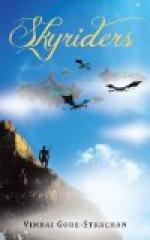Johnny Jewel forgot his pose of expert aviator. He forgot that Bland Halliday was absolutely unknown to him and that his personality was not altogether prepossessing. As a rule Johnny did not like pale eyes that seemed always to wear a veiled, opaque look. Heretofore he had not liked those new-fangled little mustaches which the Rolling R boys had dubbed slipped eyebrows. And ordinarily he would have objected to a mouth drawn at the corners in a permanent whine. To offset these objectionable features there were the greasy, brown overalls and the cap which certainly looked bird-mannish enough for any one, and there was the pilot’s license—no fake about that—and the fact that the fellow had known all about Abe Smith and the linen.
Johnny threw away his cigarette and his caution together. “Say, I might be able to take you to Los Angeles, all right—provided you will take a hand on the little old boat and help me put her in shape again. It oughtn’t to take long, if we go right after it. I—er—to tell the truth, it’s hard to get hold of any one around here that knows anything about it. Why, I had one fellow working for me, Mr. Halliday, and just for a josh I asked him where the fuselage was. And he went hunting all over the place and finally brought me a monkey wrench! He—”
“No brains—that’s the main trouble with the game,” commented Bland Halliday, after he had exhaled a long, thin wreath of smoke which he watched dreamily. “What you got?”
“Hunh? What kind of a plane? Why, it’s a tractor. A military—”
“Unh-huh. Dual dep control, or have you monkeyed with it and—?”
“It’s a regular military type tractor. It—well, it has been in government service before—”
“You an army flier? Then what ’n hell you doing here? Say, put over something I can take, bo. You don’t look the part. Only for that stuff you unwrapped, I’d tag you for a wild and woolly cowboy.”
His tone was not flattering, and his very frank skepticism ill became a tramp. But Johnny had plunged, and he swallowed his indignation and explained with sufficient truth to be convincing. He even confessed that he could not fly—yet. There was something pathetic in his eagerness and his trustfulness, though Bland Halliday seemed to miss altogether the pathos, in his greed for technical details of the damage to the plane, and a crafty inquisitiveness as to distance and location.
He smoked another of Johnny’s cigarettes, stared opaquely at the sweltering little village and meditated, while Johnny wrapped his parcels and tied them securely, and waited nervously for the decision.




